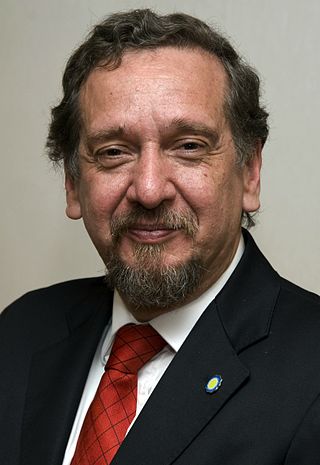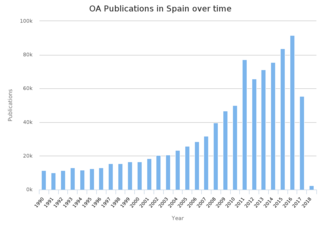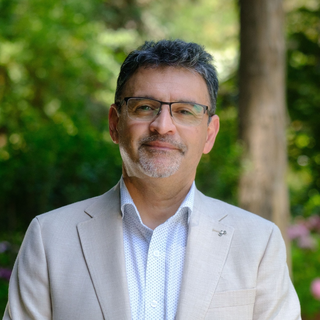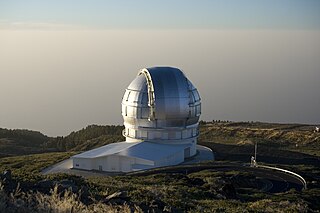
The Spanish National Research Council is the largest public institution dedicated to research in Spain and the third largest in Europe. Its main objective is to develop and promote research that will help bring about scientific and technological progress, and it is prepared to collaborate with Spanish and foreign entities in order to achieve this aim.
The Ministry of Higher Education, Science and Technology of the Dominican Republic is a government institution that regulates higher education in the country as well as research, grants and technology.

Lino Barañao is an Argentine chemist and politician. He was Minister of Science, Technology and Innovative Production of Argentina under President Mauricio Macri. He also served the same position under former president Cristina Fernández de Kirchner.
The Administrative Department of Science, Technology and Innovation, also known as Colciencias, is a Colombian government agency that supports fundamental and applied research in Colombia.

Julio Ernesto Rubio Barrios is a Mexican researcher and administrator at Monterrey Institute of Technology and Higher Education.

Guido Girardi Lavín is a Chilean doctor and politician. He was a senator in district No. 7 for Santiago Poniente. He previously served as the president of that chamber.

The presence of science and technology in Spain dates back to Spain's prehistoric period. It is taken to include firstly an account of the historical development of these fields of study, and secondly a description of the current institutional and regulatory framework for continuing this development into the future.

Ministry of Science, Technology and Innovation of Argentina is a ministry of the national executive power that oversees the government's scientific and technological policy. It oversees decentralized research and development dependencies such as the National Scientific and Technical Research Council (CONICET), the National Agency for the Promotion of Research, Technological Development and Innovation, the National Space Activities Commission (CONAE) and the National Genetic Data Bank.

The Ministry of Science and Technology is a cabinet-level ministry of the government of Angola. The mission of the ministry is to "Propose and coordinate the implementation of policies in the field of Science, Technology and Innovation, as well as their modes of organization, operation and evaluation." The current Minister of Science and Technology is Maria Cândida Teixeira.

In Spain, the national 2011 "Ley de la Ciencia, la Tecnología y la Innovación" requires open access publishing for research that has been produced with public funding. The first peer-reviewed open access Spanish journal, Relieve, began in 1995. Publishers CSIC Press and Hipatia Press belong to the international Open Access Scholarly Publishers Association.

The Ministry of Science and Innovation (MICINN) is the department of the Government of Spain responsible for developing and implementing the government policy on scientific research, technological development and innovation in all sectors. In particular, MICINN is responsible for the exercise of research, technological development and innovation competencies in space matters, including representation and participation in European Union and International organizations.

Eulalia Pérez Sedeño, is a philosopher, a specialist in science, technology, and gender and professor of investigation in the Department of science, technology and society of the Institute of Philosophy of the Higher Council of Scientific Research.

Lina Gálvez Muñoz is a Spanish economic historian and politician, and member of the European Parliament since 2019. She was Minister of Knowledge, Research and University of the Regional Government of Andalusia from 2018 to 2019. She is an expert in feminist economics and member of Economists Without Borders.

Roberto Carlos Salvarezza is an Argentine biochemist, researcher and politician. He was Argentina's Minister of Science, Technology and Innovation from 2019 to 2021, in the cabinet of President Alberto Fernández.

The 'history of science and technology in Argentina describes the fate of scientific policies and discoveries made in this country.

The Ministry of Science, Innovation, Technology and Telecommunications is part of the government of Costa Rica, it was created on 26 June 1990.

Flavio Andrés Salazar Onfray is a Chilean politician who has served as the minister of science, technology, knowledge and innovation since 2022.

Science and technology in Spain relates to the set of policies, plans and programs carried out by the Spanish Ministry of Science and Innovation and other organizations aimed at research, development and innovation (R&D&I), as well as the reinforcement Spanish scientific and technological infrastructures and facilities such as universities and commercial laboratories.

Silvia Díaz Acosta is a Chilean politician who currently serves as minister of science, technology, knowledge and innovation.
Duque appointed all the 16 ministers and high councilors before his inauguration as president, once the inauguration ceremony was over and during his government he induced the creation of two new ministries, derived from the disappeared departments of Coldeportes and Colciencias.



















